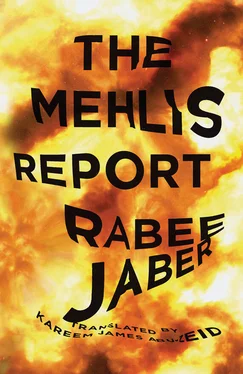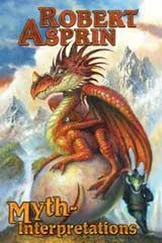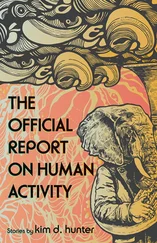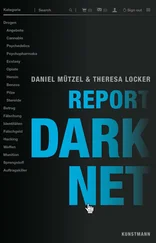“You were born in an evil hour. The old aristocratic house, the whole district. The city’s no aristocrat, but it too is passing through dark times. It’s not your fault: time’s the culprit. How can you find a story for your life, how can you write one, when you’re in this city at this hour? Beirut, suspended, waits for the unknown, and you too are in suspension. ‘Where’s his life story?’ we ask. Where’s his story? It’s a drop in the sea. Beirut has one and a half million souls. Beirut’s a ship, a ship on the sea, and the sea could rise up at any moment. Its location is to blame. We can’t lay the blame within it: it’s not in the city, and it’s not in you. The place, rather, is to blame. And the time. And then you’ve got the Anatolian Fault, the chance of an earthquake at any moment. It’s been expected for years. The plates beneath the earth’s crust are moving. And if one giant plate slips against another, the earth moves. Streets crack open. Cities collapse. The sea comes in: it draws back first, then rushes in. All these houses, all these buildings, all these gardens — in an hour all of it can end. The Anatolian Fault stretches from Istanbul to Beirut. More? No, that’s enough. A real possibility. Any moment now. The earthquake. And after it the flood.
“Listen, Saman. I call, but you don’t answer. I want to talk, I want to hear your voice, and I know you want to hear mine. You want it and you don’t. You’re split in two. You’ve been like this for years, not caring, not interested, split in two without knowing it. I call, but you don’t answer. And even if you did answer, would I speak? Would I open my mouth? Or would I deny myself? And if I spoke, would you hear me? You’re not on this side, and I’m not on yours. I see you, but I don’t touch you. When you’re sleeping, though, then I touch your head.
“I want to tell you about the Anatolian Fault. No, that’s not what I want to say. It’s part of what I want to say, but not all of it. I see you reading the papers and putting together the different stories and trying to understand. You’re trying to figure out what will happen. You remember you’ve seen the man several times sitting outside, on the terrace of the Étoile restaurant. And you remember you saw him sitting inside once too, with people whose faces you recognized. The motorcade that exploded in front of the Phoenicia, just past that hotel, you saw it leave from here, from this plaza, this square, the square right by your office. You stopped here and looked at the soldiers and policemen and parliament guards, and at the pigeons. You saw the motorcade head off, not knowing that it would explode a moment or two later — a moment more or a moment less, what does it change? The motorcade explodes and the cars catch on fire, and the explosion launches one car straight through a wall and into the depths of the sea. The motorcade explodes and a black chasm appears in the road, and the city falls into it. The whole country falls into the chasm. You look at the papers, at the television, at the edifices, at the fountains by the Municipality Building.
“What do you see when you look at things? Do you see anything at all? There’s alcohol in your blood, you stay up all night, and you don’t even cook. Why don’t you buy some meat and vegetables and milk and cheese and go home and cook your own meals? Why do you only ever eat restaurant food? If you have home cooking, it’s always something one of your girlfriends has made. And if you’re alone, you order from a restaurant or a bakery. You don’t make your own food and you don’t care. You’re split in two, but you don’t know it.
“Listen, Saman. I call, but you don’t answer. I see you standing at the demarcation line, beneath the Fuad Shihab Bridge, looking at the overhauled buildings. You think back to the old days, and do not think. You stand there at night. The cars pass by, the city is full of lights. The cars race onward. I see you and I know you’re calling me, calling on me to call you, and yet you’re not. You want me to, and you don’t. Confused, suspended. I look at you and picture your confusion, your state of suspension. Maybe I’m the one who’s confused. But how could that be? Talking is difficult. Writing even more so. At first we don’t understand. But after a while. ”
Saman has two hours before he’s meeting Cecilia. He showers and puts on some clothes, then opens the garage door behind the house and flips the switch. The white light shines on the gleaming red Dodge. It’s a 1972 model, but looks as if it just came out of the factory in America an hour ago, as if they had just brought it here wrapped in silk. There’s not a scratch to be seen on the paint. The leather upholstery is white as cotton. The thick wooden dashboard is plated with chrome that sparkles like jewels, and the steering wheel is silver-plated. It’s like sitting in someone’s living room. They don’t make cars like this anymore.
He stays in the car for a quarter hour. The engine sounds clear, like the rippling of a brook, the song of a stream: that engine makes music. A quarter hour to keep the battery charged. He doesn’t often take this car out of the garage. He does take it out, but not very often. He takes it on excursions outside of Beirut. And sometimes he takes it out at night: the traffic’s not too bad then, so he takes it out of the garage and drives out of the city for a few hours, into the bowels of the night, and then returns.
He turns off the motor. He turns off the light and locks up the garage. He grabs his cell phone and heads out. He wants to take his time. He doesn’t want to rush. Should he pick up some food on the way to Cecilia’s? Or should he wait to decide? He’ll go for the easiest thing: delivery.
The women who work at the Bread Republic are sitting on the sidewalk in front of the bakery. They’re all wearing the same white bakers’ uniforms, and they all have similar faces, as if they were sisters. The smoke from their cigarettes rises above their heads, above their hats and above the hair that sticks out beneath their hats — black hair, or blonde, or red. The smoke fills the air in front of the bakery. Inside the lighted storefront window, loaves of bread are lined up on the shelves: all different colors and shapes, white flour sprinkled over them. Light streams out from the inside, casts itself onto the sidewalk and street. On their high posts the streetlights are all dark. Most likely a power outage. Or some unannounced rationing. He thinks about going inside and buying a few of the dark round herb and black olive loaves as a gift for Cecilia, but then decides against it. He’ll get something else later. He’s only just starting out, and the bread is hot. He doesn’t want to sweat.
In front of a pet store he sees a brightly colored parrot screeching in its cage. Why’s it screeching like that? Who would ever take it? Or is that its way of singing? A cage full of cats is right beside it: small white ones that don’t really look like cats. And beneath them there’s a cage full of hamsters. Two young men are taking the cages inside. Aquariums are illuminated in the shop’s window: colored fish swim behind the glass. The adjacent vegetable store is also bringing in its goods and closing up. Bats can be seen beneath the sycamore trees. They come out at dusk, just as they do early in the morning. Whenever he passes by here in the morning, he sees the bats emerge from the sycamores and then disappear back into them. Do they live in the trees? It’s dark here. Past a bend in the road, the light of the streetlamps returns. Countless streetlamps, lots of cars, and young men and women holding banners and candles. And candles on the ground in front of the La Rose building. He takes a detour. He turns at the Abd al-Wahab intersection and starts ascending, then turns left onto Baroudi Street, then left again. Chance brings him to the Bristol Patisserie. He goes in and buys a dozen assorted little cakes. He knows what Cecilia likes, and makes his choices accordingly: ground hazelnuts; whipped cream; chocolate, but no fruit; coffee cake. Cecilia’s favorite flavors.
Читать дальше












